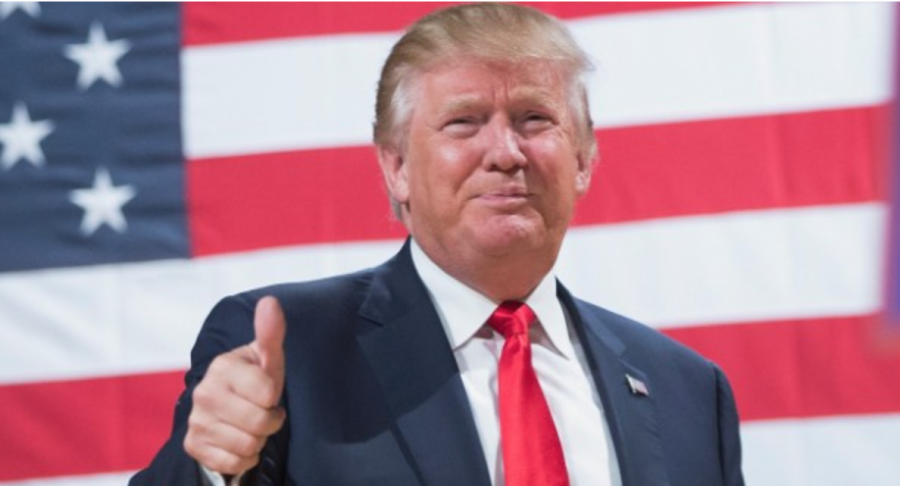History Made
There is a famous quote from Booker T. Washington that states, “Success is to be measured not so much by the position that one has reached in life as by the obstacles which he has overcome while trying to succeed.” Certainly this quote has applied to many people throughout history, however, it especially epitomizes the current circumstance of one man—President-elect Donald J. Trump.
As seen throughout the history books, upsets are sometimes imminent outcomes of political events. That being said, Trump’s unprecedented victory over Democratic rival, Hillary Clinton, shocked the masses and disproved what many said couldn’t be done. Regardless of one’s outlook on the fiercely polarizing candidate, the victory he and his campaign staff pulled off is undeniably that of an impressive one. However, in order to explain his political success, one must first reflect on the prominent misconceptions that were accentuated during the time leading up to the election.
Firstly, opponents of the Trump campaign declared that he (through his actions and disposition) would reach an all time low among women voters in the country. Moreover, this assumption was completely understandable as the release of the infamous Access Hollywood video was the talk of the nation in the few weeks that preceded election night. Of course the statements Mr. Trump made in the secretly recorded video were inappropriate and downright immature, however, it ultimately did not prove to be the nail in the coffin for the Republican politician. And while Clinton handily won the female vote overall, Trump, according to exit polls, managed to receive 54 percent of votes cast by white women. “I thought it was crazy what he said, but I was really just desensitized to all of the craziness. I was shocked to find out that he did so well with women though,” shared Zach Jenkins (16’). Overall, this figure is pretty astounding taking into account all the negative publicity that surrounded him during his time on the campaign trail.
Secondly, there was a false impression that Clinton’s ground game would be superior to her opponent’s, since Democrats usually beat Republicans when it comes to voter turnout numbers. However, this notion proved to be false as the voter turnout number for Republicans was 0.4% higher than the liberal/progressive electorate. According to the Pew Research Center, the 2016 voter turnout numbers yielded 14.4% for Democrats and contrastingly, 14.8% for Republicans. Subsequently, these numbers can be attributed to the differing campaign methods of each candidate. For instance, Clinton relied on new aged analytics to target voters, while the Trump campaign went the old fashion way, taking their messages from town to town with mega-rallies (which ultimately benefited from earned media). “Love him or hate him, you have to admit that the guy worked pretty hard to pull off what he did,” expressed Justin Jett (17’). Consequently, there was no need for Trump to corral excitement and encourage his supporters to vote. At the end of it all, Trump advocates were already eager to head to the polls, unlike Clinton’s base who proved to be slightly weaker in voter turnout numbers.
Lastly, The Republican’s pledge to build a wall along the southern border, coupled with his controversial comments about illegal immigrants, was ultimately projected to cost him the Latino vote. However, he did surprisingly better than expected. While he still lost badly with Hispanics, exit polls show he did better with the demographic than Mitt Romney did in 2012. Many analysts of the Hispanic electorate dispute those figures, but it’s clear there wasn’t the Latino boom for Clinton that many expected—though Hispanic turnout did increase somewhat across the country, particularly in battleground states. “As a girl of Dominican and Puerto Rican decent, I can attest to the fact that all Hispanics are not unanimously against Trump and/or all for Clinton. This was a huge assumption many people had based on the comments he made about Mexican immigrants,” stated Jaelies Rodriguez (17’).
In summation, Trump’s camp fought a gnarly battle with a tough and gritty campaign that, at many points, did not reflect the purest professionalism or upheld standard. Despite this, the newfound Republican politician still managed to significantly defy the odds, which entailed barrages of negative coverage, scrutiny from liberals, and even disapproval from many fellow Republicans. Besides the adversity he overcame, his campaign’s successful tactics managed to energize voters and as a result, replenish his party’s control over Congress. In retrospect, his triumph with the Republican Party is viewed as extremely astounding, considering that he was once thought to bear the death of the party. Further, he has ironically delivered prosperity to the party as a whole, and even more impressively managed to change its traditional mentality. Instead of getting intertwined with the conservative agenda on social issues and evangelical hogwash, Trump has shined light on issues that matter more to the average middle-class American, such as the economy, jobs, and foreign defense. For these reasons, he has resonated with many ordinary citizens and has even opened his arms to other groups—ranging from his adversaries, people of color, the LGBT community, and various other demographics that have traditionally never been popular with the Republican Party.



